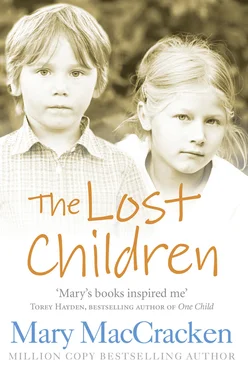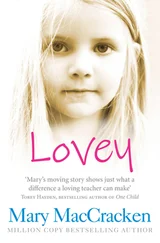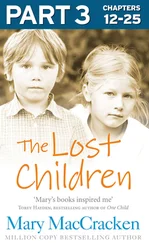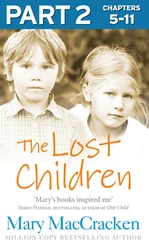Helga chooses now to ignore me. All morning she never looks again in my direction. Instead, she turns once again to Chris. Her voice lifts, half a command, half a seduction: “Come now – get off that sweater and we’ll have a bit of a rock before the day begins.”
Chris slides his eyes from the dust specks toward Helga, not moving, only looking.
She settles herself in the rocking chair and sets it in motion. “Come along now,” she calls, “get along.”
And, unbelievably, the slack, motionless figure becomes a boy. Awkwardly he takes off his sweater and hangs it on a hook beneath his name, CHRIS, and then crosses the room and climbs into the wide lap of Helga. And with her legs spread wide and her foot tapping she sings to him:
“Camptown races is my song – do dah, do dah. Camptown races all day long, all the do dah day.” And if the words are wrong, it does not bother Helga or Chris.
I watch them and then, noticing an empty coffee cup lying beside the sandbox, I go next door to the bathroom and fill it with water.
“Not this one,” I say to myself as the water runs into the cup. “You will not be rid of this volunteer so easily, Helga.” And I smile at her as I carry the water back to the sandbox.
So began our relationship, Helga’s and mine, and my education. I learned more from this strong, loving woman than from any psychology or education course I have ever taken; more than from any book, no matter how distinguished the author. I watched her, remembering, imitating, gradually doing. She breathed life back into the children. Often I watched her gather a child in her arms – one who had gone off to a corner, retreating from the world. Helga would gather him up, blow on his neck, murmur some foolish joke into his ear, take his hand, start the record player, and then dance with him around the room. Her favorite dance was the polka, and as she skipped and stomped in her sneakers, gray hair flying, half carrying her small partner with her, she would sing, “There’s a garden, what a garden, only happy faces bloom there, and there’s never any gloom there …” And gradually the child would return, the faraway look would go out of his eyes, and he would seem once more to be alive, to be back in this world.
There was about Helga such a strong sense of living, of vitality, that as she came into bodily contact with a child – rocking him, holding him from attacking himself or others, kissing him, pushing him – her vitality, her excitement, her desire of life were almost visibly transferred to the child. She could not have told me any of this herself; she was totally absorbed in her work, in her children – so much so that even at the end of the same day, if someone had asked her to describe what methods or techniques she had used to solve a problem, she would not have been able to relate what she had done. She would not even have tolerated the words “methods” and “techniques”; she was the totally natural therapeutic teacher. I was privileged to be able to watch her, and I knew it. A dozen times a day I would find myself silently saying, “Yes, yes,” as I watched her with the children. It was a feeling of silent applause and I knew I must pay attention to it.
She had that rare quality of being alive, involved in, excited by, her world. Whether this is learned or an inherited talent I am not sure, but it was one of her most valuable tools in reaching these children: the electricity that was vibrant in her reached across and touched the child, often before words could.
Helga’s husband Karl worked at a clerical job; their only son was grown, living in the West, They lived in a small upstairs apartment in a two-family house, saving money all year in order to travel. Each winter during Christmas vacation they went to Puerto Rico; in the summer they rode bicycles across Europe. Looking at Helga, I would think of my own friends, my own life, our large homes, all our possessions – and yet Helga had achieved a freedom, a sense of joy, that was absent in my own life.
It was not that she always had an admirable response or even a proper one. She did not. She was no saint. But the thing was, she did respond! She was alive, she was human, she cared, and she showed us that she did. There were no pretenses to Helga. What she felt, she communicated, and because there was no veneer it came through straight and clear.
If a child, as he gradually learned or rediscovered words, came to Helga saying, “Kite,” Helga would listen, repeat, “You like the kite. Ah – get it then. Get the kite. Let’s see it now, this red kite.”
And now Jimmy, excited by the sight and feel of the kite, tugs Helga’s arm: “Kite. Fly kite. Fly kite.”
Helga sits back on her heels from where she has been kneeling beside the boy and says, “Ah, fly the kite. So you think we should fly the kite, leave our papers and crayons, and go fly the kite. Is that what you think?”
Jimmy, ordinarily listless, pale as milk beneath his red hair, hops up and down with excitement. “Fly kite, Helga. Go fly kite.”
Helga grins, satisfied with her work, with the extra words she has managed to extract from Jimmy, and says, “All right, you monkey – we’ll leave the work and go fly the kite.”
And soon all of us – the four children, myself, and Helga – have on our jackets and are trudging out to the field beyond the school, Jimmy carrying the kite. Then they run, the small red-haired boy and Helga in her sneakers. They run holding the string of the kite together, getting it started – until suddenly the kite lifts and sails up high, like hope itself, flashing, tipping against the sky, and we cheer and clap our hands.
I cannot remember now how many weeks it was before Helga spoke to me. I remember that I felt no resentment because of her silence. It seemed to me a logical thing: she was trying to do something important, and volunteers got in her way; it was natural that she be impatient with me. At the same time I had no intention of leaving.
There were other teachers in the school who were good. I watched them in morning assemblies and in the playground and at lunch, but none of them rang the bell for me the way Helga did. Her children grew faster than any others, became independent sooner – or so it seemed to me. I knew I could learn more from her than from anyone else. Whether she liked me or not was not essential. I was not lonely. I did not need her friendship; I needed her example.
For instance, I watched her teach Sarah to walk. Sarah did not walk at all when she first came to school. She was five, with pale yellow hair and the fine, silky skin of a baby. She was a week late starting school because she had been ill, so I was there when she came that first day. Her mother carried her up the stairs to Helga’s room, spread a blanket, and laid her on the floor. There Sarah curled up on her side, her thumb in her mouth. Helga said nothing; but after the mother had left, Helga slipped the blanket from beneath Sarah, folded it, and put it in the back of a closed cupboard. The little girl whimpered and cried, the other children circling around her as I have seen a flock of sea gulls do when one of the birds is injured. The morning was ruined, the children upset and fretful; no work could be done with Sarah mewling, crying, there on the floor. Another teacher might have let her keep the blanket that first day while she adjusted to the school. Not Helga. She would set no such precedent in her classroom – a five-year-old child was not treated like an infant, left lying in a blanket.
Finally Sarah moved. Painfully, slowly, she crawled across the floor, stopping every few minutes to rest, then continuing her slow, tortuous journey as we watched, holding our breath. She made her way directly to the cabinet where Helga had put her blanket, and scratched with her tiny hands at the door. Helga picked her up then and carried her to the rocking chair, talking to her, mixing German words with English:
Читать дальше












